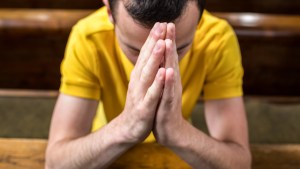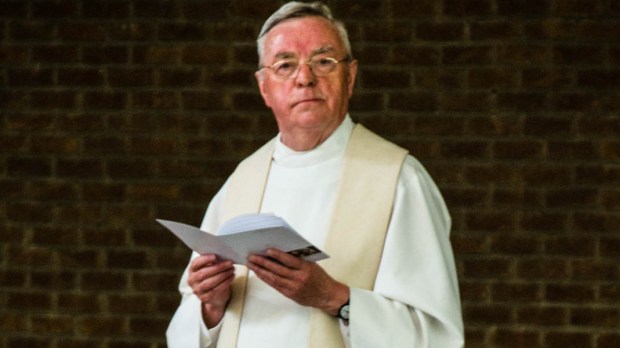Want to crush the morale of a priest? Say or do the following:
1. “Father, my favorite part of the Mass is the hug part!” 2. “Why didn’t we do the cup thing today? I really like the cup thing!” 3. “Father we’re running low on hosts—should I put more in the tabernacle for you to give out at Mass?” 4. “The most important part of the wedding Mass is the unity candle!” 5. “Why don’t we vote on music that we like for Mass?” 6. “What can we do to make the Mass more fun for kids?” 7. Come to Mass wearing faded gym shorts, dirty sneakers and a t-shirt celebrating your favorite rock band. 8. To receive Holy Communion, put out one hand and look bored, as if Father were giving you a complimentary poker chip at Atlantic City and you wanted to be somewhere else. 9. Wander off absentmindedly with a Host in your hand, and, just as Father is about to catch up with you, pop the Host in your mouth as if he had given you a cough drop. 10. After Mass, look puzzled when Father is horrified upon finding Hosts in hymnals, prayer books or under the pews.
Do I exaggerate? Not at all. Each of the 10 above I have either witnessed myself or have been told about by faithful priests. One priest, overcome by exasperation, told me, “I don’t know how I can go on offering Mass in public any longer.”
And what has this approach to worship, which one priest I know described as, “At best—business casual,” done for the laity? Has it filled our parishes? Produced a boom in vocations? Has it produced the saints and heroes the Church needs of her children?

Read more:
How to Help Priests Smell Like Their Sheep
At this point, you may recall Mark Twain’s quip: “Everyone complains about the weather, but no one does anything about it.” Generating complaints and accusations seems to be a growth industry in the Catholic blogosphere these days, and I don’t mean to join the array of pointing fingers.
I will simply ask this: “Can’t we have an honest conversation about how we worship? And can’t we have an honest conversation about how honoring God (or not) affects our souls?”
One of the best authors at work today in addressing such questions is Peter Kwasniewski. His latest books, Resurgent in the Midst of Crisis and Noble Beauty, Transcendent Holiness, are models of clarity, charity, erudition, wit, and humble wisdom.
He offers us a clear sense of what must be stopped: “…we must stop compromising when it comes to the worship of Almighty God; we must carefully avoid, or banish from our churches, all mediocrity, banality, worldliness, and modernism. Nay, more: the rational creature, whether angelic or human, owes God rightful, reverent worship; we have an obligation, more fundamental and more urgent than any other obligation of justice, to praise, bless, adore, and give thanks to the Most Holy Trinity, our first beginning and last end, in the manner he has revealed to be fitting to his glory and honor.”

Read more:
Benedict XVI reiterates that Liturgy is central to the life of the Church
He speaks of worship as a matter of justice. You’ve surely heard endless talk from Catholics about justice, especially about social justice. When was the last time you heard of worship as a matter of justice? But Aquinas makes clear that the virtue of religion includes “the worship due to Him as the source of all being and the principle of all government of things.” How can we do that?
Again we can learn from Kwasniewski: “This ‘sense of seriousness’ is precisely what ritual or ceremonial solemnity serves to promote by creating and fostering the right attitude in worshipers — the awareness that we are, or will soon be, kneeling before the King of Kings and Lord of Lords, the Crucified and Risen Savior hidden under the veil of the Holy Eucharist, and that this privileged position of ours demands from us the utmost humility, adoration, and hunger for holiness. Only when these virtues (and others akin to them) characterize, visibly and audibly, every aspect of our public worship will we have liturgy that is authentically sacred, true to its own immutable nature, and therefore spiritually healthy for all who partake of it.”
That “sense of seriousness” in worship that he speaks of, is a fundamental human need, recognized by wise men through the ages. Centuries before Christ, the philosopher Plato wrote: “Let parents then, bequeath to their children, not riches, but the spirit of reverence.” For the love of God and neighbor, for the sake of morale of discouraged yet faithful priests, can we have an honest and charitable conversation about the worthy worship of God?
When I write next, I will continue our reflections on reverence and worship. Until then, let’s keep each other in prayer.

Read more:
Bored at Mass? A 7-step method to fix that
Hear Fr. McTeigue discuss this column with John Harper on the Morning Air radio show here. Father’s segment begins at minute 23:00

